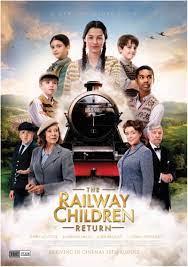
THE RAILWAY CHILDREN RETURN
UK, 2022, 95 minutes, Colour.
All Jenny Agutter, Sheridan Smith, Tom Courtenay, Beau Gadsdon, Hugh Quarshie, John Bradley, Austin Haynes, Jessica Baglow, KJ Aikens, Eden Hamilton, Zac Cudby.
Directed by Morgan Matthews.
Nostalgia. British nostalgia. September 2022 saw (what is that word) unprecedented manifestations of British nostalgia at the death of Queen Elizabeth. No denying British nostalgia in the 21st-century.
Already in 1971, with the popularity of the film, The Railway Children, based on characters by E.E.Nesbitt, the loving return to the British past was in view. Now, 50 years later, the action taking place in 1944, the movement of city children to families in the British countryside, takes us back to that patriotic past, family bonds, the wars interruption to the traditional way of family life.
And, here is Jenny Agutter again, 50 years later, taking up her character from the earlier film. However, the strong Jenny Agutter kind of teenage heroine is played by Beau Gadsdon, leaving her war-widowed mother in Salford, guiding her brother and sister to Oakford, being taken in by the local schoolmistress, Sheridan Smith, and made to feel at home – despite some rather mean-minded local boys scoffing and throwing stones at the refugees from the cities.
So far so nostalgic. However, there is a brief initial indication of something else, MPs raid a local restaurant attacking the African-American GIs. And, suddenly, this becomes a key issue of the film, a young man racially bullied, having joined up to follow his brother’s patriotic footsteps, now wanting to get away from the war within the American troops. He is discovered by the children – and various adventures follow, helping him, hiding him, trying to get him on a train to Liverpool, running foul of the military authorities.
This seem to be a good idea for the plot of the film – but, so many of the comments on the IMDb condemn this, upbraiding the makers for inserting these themes into such a lovely nostalgic story, and introducing that contemporary condemnatory word, that this theme introduction is “woke”.
Work or not, we remember that the Americans were “over there”, that they were welcomed by the British, that many marriages ensued. And, we remember, the black lives mattered then.
So, 21st-century writers have taken up the original characters and invented this story. Why not? (This reviewer watched the film at a Saturday 2 o’clock session, not a big audience, no children, but, in fact, most of the audience were at the age of children of those 1944 railway children.)
- The popularity of the original film? The novel? The characters, television presentations? The use of the characters and situations for another Railway Children film?
- 1944, the city of Salford, the war, bombings, the railway station, the farewelling of the children? At of staying behind, hospital work? The countryside, the town of The Rockford, the railway station, homes, school, the railyards and carriages? The streets, the restaurants? The musical score, songs of the time?
- The three children, separation from her mother, not telling that their father had died in war? The other children on the train? The parents arriving and selecting the children? The three not taken? Bobby, her memories of the past? Annie, her husband at War, Thomas, taking in the three, the accommodation?
- Lily, strong character, age, projective? Angela, Ted, the touch of mischief? The friendship with Thomas? Going to school, the locals in the stonethrowing, Lily asserting herself?
- Life in the town, nostalgia, memories of Britain prewar, the war effort?
- The scene with the MPs, the black soldiers, the trouble? This theme recurring, becoming one of the main themes?
- The talk of the bombings, spies and agents? The discovery of Abe? The reaction, seen as an agent, Lily and her concern, the wound in his leg, getting the material from the house, first-aid, slipping out? The bomber, dropping the bomb, the crater? Abe rescuing her?
- Helping Abe, the reaction of the children? Bringing him into the house?
- The railway station, Richard, eating the sandwiches, his radio, listening to the programs, seeing himself as an agent? Thomas getting the timetable for Liverpool?
- The plan, to get to the station, Lily helping Abe? Distracting Richard? Rounding up all the children, painting the sign?
- The children, holding up the sign, Thomas standing on the track, the train stopping, Lily and Abe in the train? Captured, bound?
- The general on the train, getting off, the situation, Lily and Abe, the racist MP? The discussion with the general, about children in war, Abe and his signing up? The general letting them go?
- Annie, her response, Bobby and the past suffragette work?
- The children revealing to Thomas that their father was dead? His mother’s concern and her husband prisoner of war, Thomas upset at her not telling him?
- Abe, rehabilitated, leaving for America? And the children happy? And the end of the war and post-war Britain?.